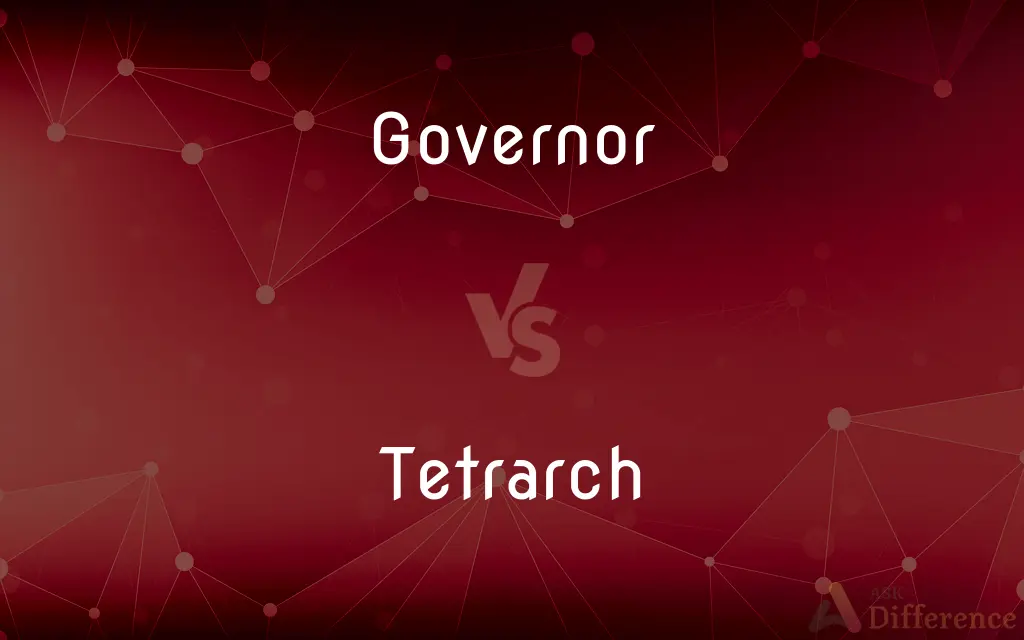Governor vs. Tetrarch — What's the Difference?
By Tayyaba Rehman & Maham Liaqat — Updated on April 29, 2024
Governor refers to the official head of a state or province, typically elected or appointed, focusing on administrative responsibilities; tetrarch, historically, indicates a ruler of a quarter of a region, especially during Roman and Hellenistic periods.

Difference Between Governor and Tetrarch
Table of Contents
ADVERTISEMENT
Key Differences
A governor is commonly recognized as the administrative head of a state or province, responsible for implementing state laws and overseeing the executive branch. On the other hand, a tetrarch historically referred to a ruler who governed one of four divisions of a country or region, particularly in the Roman Empire and Hellenistic kingdoms. This term is often associated with regions under Roman influence where a kingdom or territory was divided among four rulers.
Governors are typically appointed or elected in a modern governmental context, serving terms that can be renewed based on election cycles. In contrast, tetrarchs were appointed based on royal lineage or by Roman decree during the Roman Empire, without the democratic processes associated with modern governors.
The role of a governor is largely administrative, involving a broad range of duties from law enforcement to economic policy. Whereas tetrarchs primarily focused on the governance of their quarter of the territory, often with considerable autonomy but under the overarching control of the empire.
Modern governors may have significant influence over state legislation through veto powers and the ability to call legislative sessions. On the other hand, the authority of a tetrarch was generally more restricted to regional concerns, without powers extending to national legislation or overarching legal systems.
While governors exist within the political frameworks of today’s nation-states, often seen in countries like the United States, Australia, and Canada, the role of tetrarch has largely disappeared, surviving mainly as a historical term that describes a governance style from a past era.
ADVERTISEMENT
Comparison Chart
Definition
Administrative head of a state or province.
Ruler of one-fourth of a region, historically during Roman times.
Basis of Appointment
Elected or appointed by democratic means.
Appointed based on royal lineage or imperial decision.
Role Focus
Broad administrative responsibilities including law enforcement, public policy.
Governed regional affairs with a focus on local autonomy within an empire.
Power in Legislation
Can influence state legislation, has veto powers.
Limited to regional control, no influence over national laws.
Current Usage
Common in contemporary political systems.
Historically specific, not used in modern governance.
Compare with Definitions
Governor
Informal usage denotes control or restraint.
She kept a tight governor on her emotions during the meeting.
Tetrarch
Can imply a subordinate or secondary ruler in ancient contexts.
As a tetrarch, his powers were limited compared to the emperor.
Governor
Head of state or province responsible for implementing laws and overseeing the executive branch.
The governor signed new legislation to improve public health.
Tetrarch
Sometimes used metaphorically in discussions of divided leadership.
The committee acted like a group of tetrarchs, each with their own agenda.
Governor
An official appointed or elected to manage a political entity's executive branch.
The governor addressed the state during a televised speech.
Tetrarch
A ruler of one-quarter of a country, under Roman administrative divisions.
Herod Antipas was named tetrarch of Galilee.
Governor
In corporate or organizational contexts, someone who oversees the management and policy-making.
The board of governors approved the new strategic plan.
Tetrarch
Used in historical contexts to describe the governance style in Hellenistic and Roman territories.
The tetrarch had his own court and army.
Governor
Can refer to a device regulating the speed or operation of a machine.
The steam engine's governor helps maintain a steady speed.
Tetrarch
Refers specifically to the division of territories in the Roman Empire.
The tetrarch’s region was known for its agricultural productivity.
Governor
A governor is, in most cases, a public official with the power to govern the executive branch of a non-sovereign or sub-national level of government, ranking under the head of state. In federations, governor may be the title of a politician who governs a constituent state and may be either appointed or elected.
Tetrarch
A subordinate ruler.
Governor
An official appointed to govern a town or region.
Tetrarch
One of four joint rulers.
Governor
The head of a public institution
The governor of the Bank of England
Tetrarch
A governor of one of four divisions of a country or province, especially in the ancient Roman Empire.
Governor
The person in authority; one's employer.
Tetrarch
The commander of a subdivision of a phalanx in ancient Greece.
Governor
A device automatically regulating the supply of fuel, steam, or water to a machine, ensuring uniform motion or limiting speed.
Tetrarch
A governor or ruler of a quarter of a country, especially of a fourth part of a province in or client state of Ancient Rome.
Governor
The chief executive of a state in the United States.
Tetrarch
Each of the four members of a jointly ruling tetrarchy, notably of the Roman Empire since Diocletian.
Governor
An official appointed to govern a colony or territory.
Tetrarch
An officer in charge of a fourth part of a phalanx in Ancient Greece.
Governor
A member of a governing body.
Tetrarch
A Roman governor of the fourth part of a province; hence, any subordinate or dependent prince; also, a petty king or sovereign.
Governor
The manager or administrative head of an organization, business, or institution.
Tetrarch
Four.
Governor
Abbr. Gov. A military commandant.
Governor
Chiefly British Used as a form of polite address for a man.
Governor
A feedback device on a machine or engine that is used to provide automatic control, as of speed, pressure, or temperature.
Governor
(politics) The chief executive officer of a first-level division of a country.
Governor
A device which regulates or controls some action of a machine through automatic feedback.
Governor
A member of a decision-making for an organization or entity (including some public agencies) similar to or equivalent to a board of directors (used especially for banks); a member of the board of governors.
Governor
(informal) Father.
Governor
(informal) Boss; employer; gaffer.
Governor
Term of address to a man; guv'nor.
Governor
(grammar) A constituent of a phrase that governs another.
Governor
(dated) One who has the care or guardianship of a young man; a tutor; a guardian.
Governor
(nautical) A pilot; a steersman.
Governor
One who governs; especially, one who is invested with the supreme executive authority in a State; a chief ruler or magistrate; as, the governor of Pennsylvania.
Governor
One who has the care or guardianship of a young man; a tutor; a guardian.
Governor
A pilot; a steersman.
Governor
A contrivance applied to steam engines, water wheels, and other machinery, to maintain nearly uniform speed when the resistances and motive force are variable.
Governor
The head of a state government
Governor
A control that maintains a steady speed in a machine (as by controlling the supply of fuel)
Common Curiosities
In what countries are governors currently active roles?
Governors are common in the United States, Canada, India, Japan, and various other countries with federal or quasi-federal political structures.
How do the roles of governors and tetrarchs differ in terms of power?
Governors often have significant administrative powers and may have legislative influence within their states, whereas tetrarchs had limited authority, primarily over regional governance without legislative influence.
What is the origin of the term 'tetrarch'?
The term 'tetrarch' derives from the Greek words 'tetra', meaning four, and 'arche', meaning ruler, reflecting the division of territory into four parts.
Was a tetrarch independent in their governance?
Tetrarchs had autonomy over regional matters but were ultimately under the control of larger imperial or royal structures, such as the Roman Emperor.
What responsibilities does a governor typically have?
A governor's responsibilities include enforcing state laws, signing legislation, managing the state's budget, and overseeing state agencies.
Do any modern governments use a system similar to tetrarchy?
While not called tetrarchy, some modern federal systems divide power regionally, which can be somewhat analogous, though usually with more integrated national governance.
Can a governor declare a state of emergency?
Yes, governors can declare states of emergency within their jurisdictions to manage crises such as natural disasters or large-scale accidents.
Who appoints a governor?
In the U.S., governors are elected by the people of the state they govern, but in some countries and territories, a governor might be appointed by the national government.
Are there any famous historical tetrarchs?
Herod Antipas, known for his role in the story of Jesus' crucifixion in the New Testament, is one of the most famous tetrarchs.
What kind of powers did tetrarchs specifically have?
Tetrarchs primarily managed local military forces, collected taxes, and enforced local laws within their territories.
How does the public view the role of a governor compared to a tetrarch?
The role of a governor is typically viewed as a practical and contemporary political position, whereas tetrarch is seen as an antiquated term from a historical governance system.
What symbols of authority did tetrarchs use?
Tetrarchs often used specific insignia, such as coins bearing their images and inscriptions, to signify their rule and authority over their territories.
What impact do governors have on local vs. national policy?
Governors primarily impact local and state policies, although their decisions can have broader implications, especially in larger or more populous states.
How long does a governor serve, and can they be re-elected?
The term length for governors varies by state or country, typically ranging from 2 to 6 years; many are eligible for re-election.
What happens when a tetrarchy system fails or a tetrarch dies?
Historically, the death or failure of a tetrarch could lead to redivision of the territories among remaining rulers, or the central authority might appoint new tetrarchs.
Share Your Discovery

Previous Comparison
Mayonnaise vs. Butter
Next Comparison
Centrifusion vs. CentrifugationAuthor Spotlight
Written by
Tayyaba RehmanTayyaba Rehman is a distinguished writer, currently serving as a primary contributor to askdifference.com. As a researcher in semantics and etymology, Tayyaba's passion for the complexity of languages and their distinctions has found a perfect home on the platform. Tayyaba delves into the intricacies of language, distinguishing between commonly confused words and phrases, thereby providing clarity for readers worldwide.
Co-written by
Maham Liaqat















































